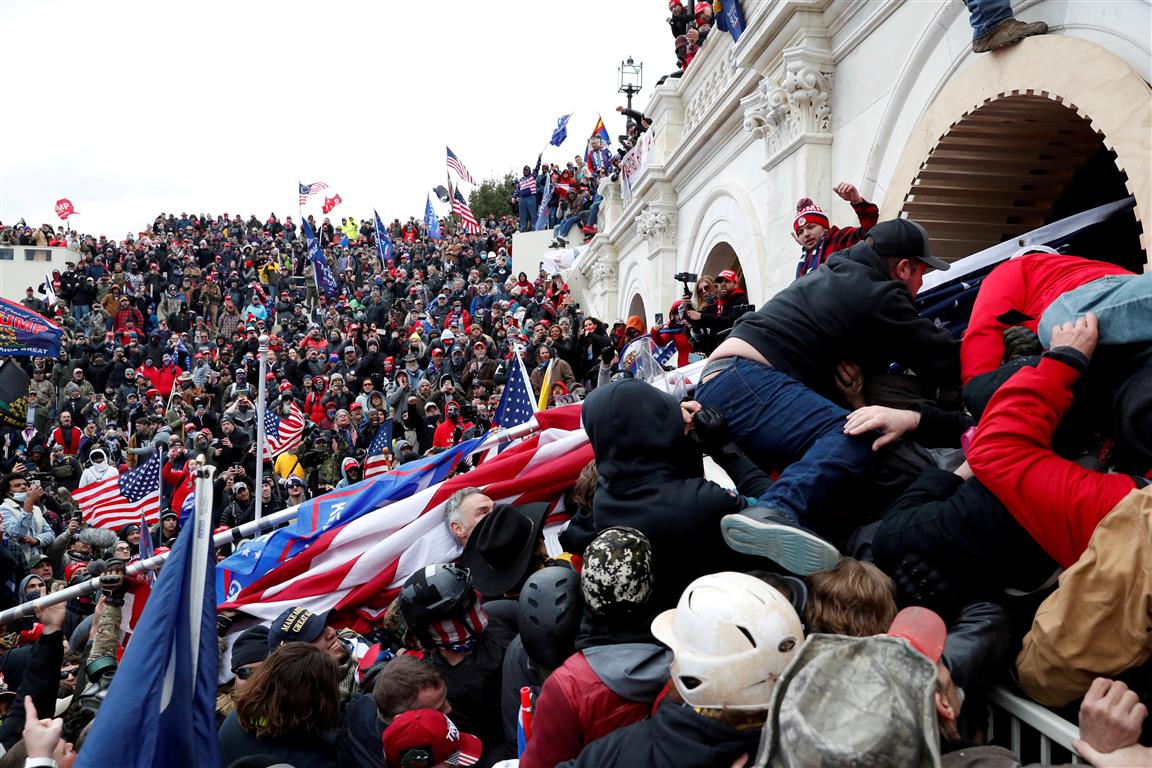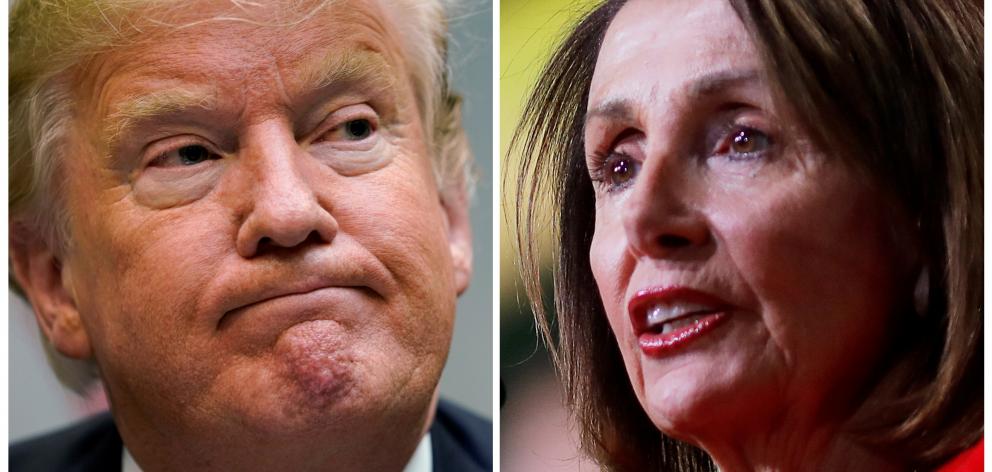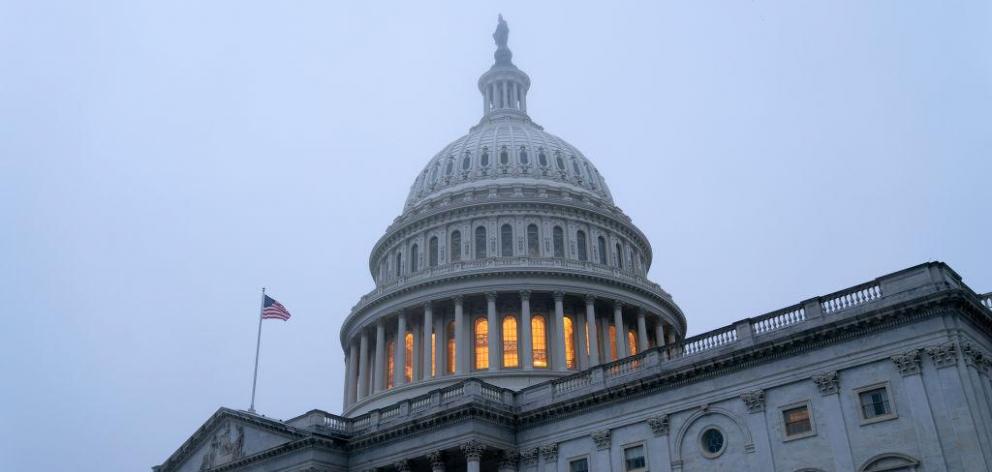
CNN reported the death earlier today but police later said reports of the death were inaccurate.
However, Capitol Police have now confirmed that Officer Brian Sicknick died after being injured when supporters of US President Donald Trump stormed the Capitol on Wednesday (local time).
"Officer Sicknick was responding to the riots on Wednesday, January 6, 2021, at the U.S. Capitol and was injured while physically engaging with protesters," the police said in a statement, adding that he died on Thursday night.
Metropolitan homicide officials will investigate the death of Sicknick, who joined the US Capitol Police in 2008, along with the USCP and its federal partners, police said.
Trump condemned the violence, saying rioters had defiled the seat of American democracy and must be held accountable.
Police earlier said several officers had been injured and some hospitalized after the unrest, but that no officers had died.
Sicknick's death brings to five the number of people who died after Trump's supporters swarmed the building in a failed attempt to disrupt efforts to certify President-elect Joe Biden's victory
Meanwhile, Trump has reportedly said he is considering pardoning himself in discussions with aides since the November election, as Speaker Nancy Pelosi called for his impeachment.
The New York Post on Thursday cited two unidentified people with knowledge of the discussions on the pardon - an extraordinary use of presidential power by Republican Trump.

"In several conversations since Election Day, Mr Trump has told advisers that he is considering giving himself a pardon and, in other instances, asked whether he should and what the effect would be on him legally and politically, according to the two people," the Times reported.
The White House did not immediately respond to a request for comment.
The newspaper said it was not clear whether he had discussed the matter since the storming of the US Capitol by his supporters on Wednesday, which has prompted calls for his removal from office by the top two Democrats in Congress.
Trump, who has issued a series of pardons to political allies and friends, said in a 2018 Twitter post that "I have the absolute right to PARDON myself."
His term ends on January 20 and he faces state legal actions that would not be covered by a federal pardon. They include a criminal probe by Manhattan District Attorney Cyrus Vance and a civil probe by New York Attorney General Letitia James into whether he inflated asset values to obtain loans and tax benefits in his business dealings.
Constitutional lawyers say there is not a definitive answer on whether a president can lawfully issue a self-pardon. No president has tried it before, so the courts have not weighed in.
"When people ask me if a president can pardon himself, my answer is always, 'Well, he can try,'" said Brian Kalt, a constitutional law professor at Michigan State University. "The Constitution does not provide a clear answer on this."
Some legal experts have said a self-pardon would be unconstitutional because it violates the principle that nobody should be the judge in his or her own case.
CALL TO IMPEACH TRUMP
The top two Democrats in Congress have called for Trump to be removed from office, after a harrowing assault on American democracy.
The unprecedented breach of the Capitol building forced Vice President Mike Pence and members of Congress to be evacuated just as they had convened to certify the 2020 election victory of President-elect Joe Biden over Trump.
Four people died in the mayhem, including a woman shot by police. US Capitol Police Chief Steven Sund said on Thursday he would resign effective on January 16, according to a letter cited by news outlets.
Trump pledged in an early-morning statement an "orderly transition" ahead of Biden's inauguration on January 20, in part to prevent more staffers from leaving. Yet he has stood by the false charge the election was stolen from him.
Trump has not condemned the extraordinary violence that unfolded after he encouraged supporters on Wednesday to march to the Capitol, despite pleas from senior members of his administration.
With 13 days left in Trump's term, House of Representatives Speaker Nancy Pelosi and Senate Democratic Leader Chuck Schumer said Pence should invoke the US Constitution to remove him from office before then. They said Congress should then move quickly to expel Trump through the impeachment process.
"Yesterday, the President of the United States incited an armed insurrection against America," Pelosi told reporters at the US Capitol, adding that Trump committed a "seditious act".
"We are in a very difficult place in our country as long as Donald Trump sits in the White House."
Members of Trump's Cabinet and allies of the Republican president have discussed invoking the 25th Amendment of the US Constitution which allows them to remove a president who is unable to discharge the powers and duties of his office, a source familiar with the situation said, though another source said that was unlikely.
Congress formally certified Democratic President-elect Joe Biden's election victory early on Thursday, after they were forced into hiding by hundreds of rioters who overwhelmed police and invaded the building. More than half of House Republicans and eight senators voted to challenge the election results. During the proceedings, Pelosi pulled Pence off the House floor to talk.
Seditious conspiracy charges as well as rioting and insurrection will be considered for those arrested in the breach of the Capitol, Justice Department officials said on Thursday.
BIDEN BLAMES TRUMP: 'IT WAS CHAOS'
President-elect Joe Biden said Trump fomented the violence at the US Capitol, calling it one of the darkest days in the history of the country and an assault on democracy.
Biden, speaking in Wilmington, Delaware, where he was introducing nominees for his Justice Department, called the Trump supporters who forced their way into the Capitol building "domestic terrorists".
"Don't dare call them protesters. They were a riotous mob, insurrectionists, domestic terrorists. It's that basic," Democrat Biden said.
"He unleashed an all-out assault on the institutions of our democracy from the outset, and yesterday was but the culmination of that unrelenting attack," Biden said of Republican Trump.
He said it was "totally unacceptable" that police had shown more leniency toward the mob than police around the country had toward lawful anti-racism protesters last year.
"No one can tell me that if it had been a group of Black Lives Matters protesters, they wouldn't have been treated very, very differently than the mob of thugs that stormed the Capitol. We all know that's true. And that is unacceptable," Biden said.
He added that officials in his Justice Department would have loyalty to the law, not the president.

CALLS FOR TRUMP TO LEAVE
Dozens of Democrats have called for Trump to be removed through the 25th Amendment or impeachment. At least two Republicans, Maryland Governor Larry Hogan and US Representative Adam Kinzinger of Illinois, also said he should go.
But several Republican sources said the 25th Amendment effort was unlikely to go anywhere, given Trump's short time remaining in office.
Meanwhile, Trump faced a staff exodus. One Cabinet official, Transportation Secretary Elaine Chao, who is married to top Senate Republican Mitch McConnell, said she would resign, citing the violence.
Other Trump officials, including top Russia adviser Ryan Tully and envoy Mick Mulvaney, Trump's former chief of staff, also quit. More departures were expected.
Democrats' drive to remove Trump through impeachment fell short in February 2020, when the Republican-led Senate voted to acquit him on charges of abuse of power and obstructing Congress after Trump pressured Ukraine to investigate Biden.
Facebook, a key social media platform for Trump, also said it would ban Trump posts until Biden's January 20 inauguration. Online retailing platform Shopify said it would take down Trump stores.
Trump has increasingly isolated himself in the White House, relying on a small group of diehard loyalists and lashing out at Pence and others who dare to cross him, four sources say.
"Don't want to," said one adviser, speaking on the condition of anonymity, when asked if there had been any recent contact with the president.
Trump was extremely agitated on Wednesday, moving from the Oval Office to the nearby private dining room, initially energised, but increasingly angry and closed off, said one source.
Trump was not allowing staff to help craft any messages earlier in the day. "It's not a controlled situation," said the source, speaking on condition of anonymity.
The president has surrounded himself with an ever-smaller group of loyalists who cater to his whims, including digital director Dan Scavino, personal aide John McEntee, trade adviser Peter Navarro, speechwriter Stephen Miller, and personal lawyer Rudy Giuliani, one source said.
"It's sad. These are the people around him and egging him on," the source said, who also asked not to be identified.
Former Trump aide Sam Nunberg said Trump's temperament reflected his aversion to losing.
"This is him at the end, when he loses something. This is the way it is, the end," Nunberg said.
On Capitol Hill, new fencing was being installed around the Capitol ahead of Biden's inauguration.
The assault on the Capitol was the culmination of months of divisive and escalating rhetoric by Trump and his allies around the November 3 election, with the president repeatedly making false claims that the vote was rigged and urging his supporters to help him overturn his loss.
The Senate and the House rejected two objections by Republican lawmakers to the tally and certified the final Electoral College count, with Biden receiving 306 votes and Trump 232 votes.
Election officials of both parties and independent observers have said there was no significant fraud in the election. Biden received 7 million more votes than Trump in the national popular vote.

The storming of the US Capitol by Trump supporters has prompted calls by some lawmakers to remove him from office before Biden is sworn in on January 20.
The chaotic scenes unfolded after Republican Trump, who has refused to commit to a peaceful transfer of power, addressed thousands of protesters and repeated unfounded claims that the election was stolen from him.
There are two ways to remove a president from office: the 25th Amendment of the US Constitution and impeachment followed by a Senate conviction. In either scenario, Vice President Mike Pence would take over until Biden's inauguration.
A source familiar with the effort said here have been some preliminary discussions among some Cabinet members and Trump allies about invoking the 25th Amendment.
What's the purpose of the 25th Amendment?
The 25th Amendment, ratified in 1967 and adopted in the wake of President John F. Kennedy's assassination in 1963, deals with presidential succession and disability.
Section 4 addresses situations where a president is unable to do the job but does not step down voluntarily.
The drafters of the 25th Amendment clearly intended for it to apply when a president is incapacitated by a physical or mental illness, experts say. Some scholars have also argued that it could also apply more broadly to a president who is dangerously unfit for office.
For the 25th Amendment to be invoked, Pence and the majority of Trump's Cabinet would need to declare that Trump is unable to perform the duties of the presidency and remove him. Pence would take over, in that scenario.
Trump could subsequently declare that he is capable of resuming the job. If Pence and the majority of the Cabinet do not contest Trump's determination, Trump regains power. If they dispute Trump's declaration, the issue would then be decided by Congress, but Pence would continue to act as president until then.
A two-thirds majority of both Chambers would be needed to keep Trump sidelined. But the Democratic-controlled House could simply delay voting on the substantive dispute until Trump's term ends, said Paul Campos, a professor of constitutional law at the University of Colorado.
Campos said the 25th Amendment would be an appropriate way to remove Trump from office and has the benefit of being quicker than impeachment.
"Pence could instantly become president, whereas impeachment and conviction could take at least a few days," Campos said.
Can Trump be impeached and removed?
Yes.
A misconception about “impeachment” is that it refers to the removal of a president from office. In fact, impeachment refers only to the House of Representatives, the lower chamber of Congress, bringing charges that a president engaged in a "high crime or misdemeanor" - similar to an indictment in a criminal case.
If a simple majority of the House’s 435 members approves bringing charges, known as “articles of impeachment,” the process moves to the Senate, the upper chamber, which holds a trial to determine the president’s guilt. The Constitution requires a two-thirds vote of the Senate to convict and remove a president.
Trump was previously impeached by the Democratic-led U.S. House in December 2019 on charges of abuse of power and obstruction of Congress stemming from his efforts to pressure Ukraine to investigate Biden and his son. Trump was acquitted by the Republican-led Senate in February 2020.
What "high crime and misdemeanour" could Trump be accused of?
Frank Bowman, a professor of constitutional law at the University of Missouri, said Trump "arguably fomented sedition," or an attempted overthrowing of the US government.
But Bowman said Trump could also be impeached for a more general offence: disloyalty to the U.S. Constitution and failing to uphold his oath of office. Congress has discretion in defining a high crime and misdemeanour and is not limited to actual criminal offences.
"The essential offence would be one against the Constitution - one of essentially trying to undermine the lawful results of a lawfully conducted election," Bowman said.
Comments
Had these terrorist not been white, they would have been mowed down in a hail of bullets before they reached the top of the stairs. The obvious complicity of much of the Capital Police Force is going to result in a big clean out of white supremacists from police forces around the country.
Next time they try this, their white privilege won't save them.
History shows that taking part in a failed coup never offers one much of a future, and now their Fuhrer has abandoned then as well, they will wake up in prison one day soon and realise that they were sucked in by a lying cowardly con man.












